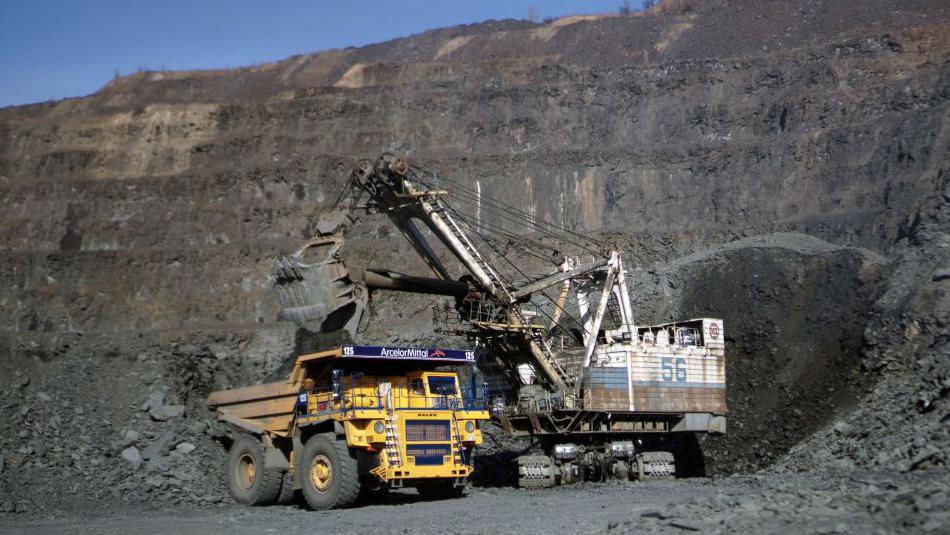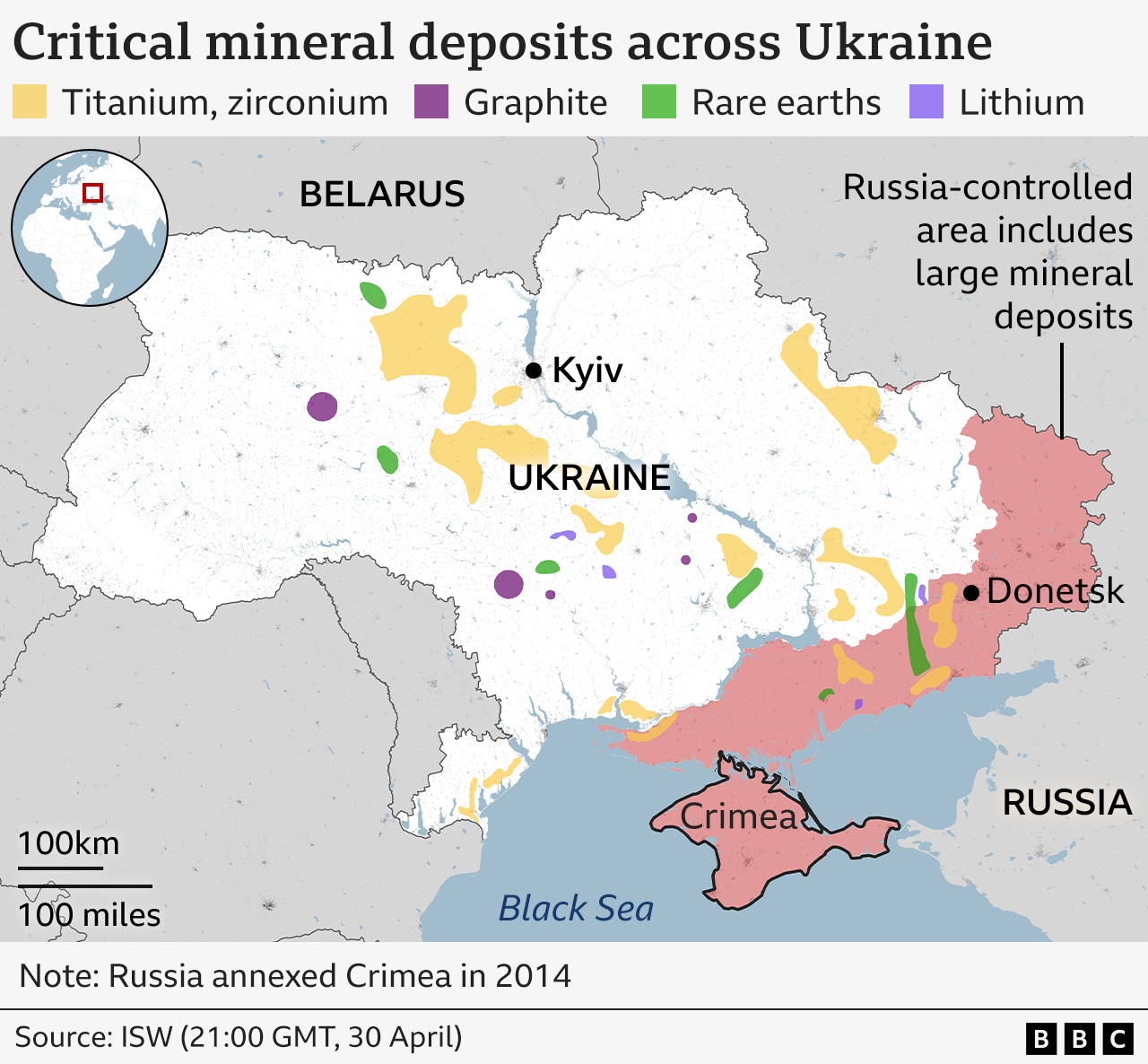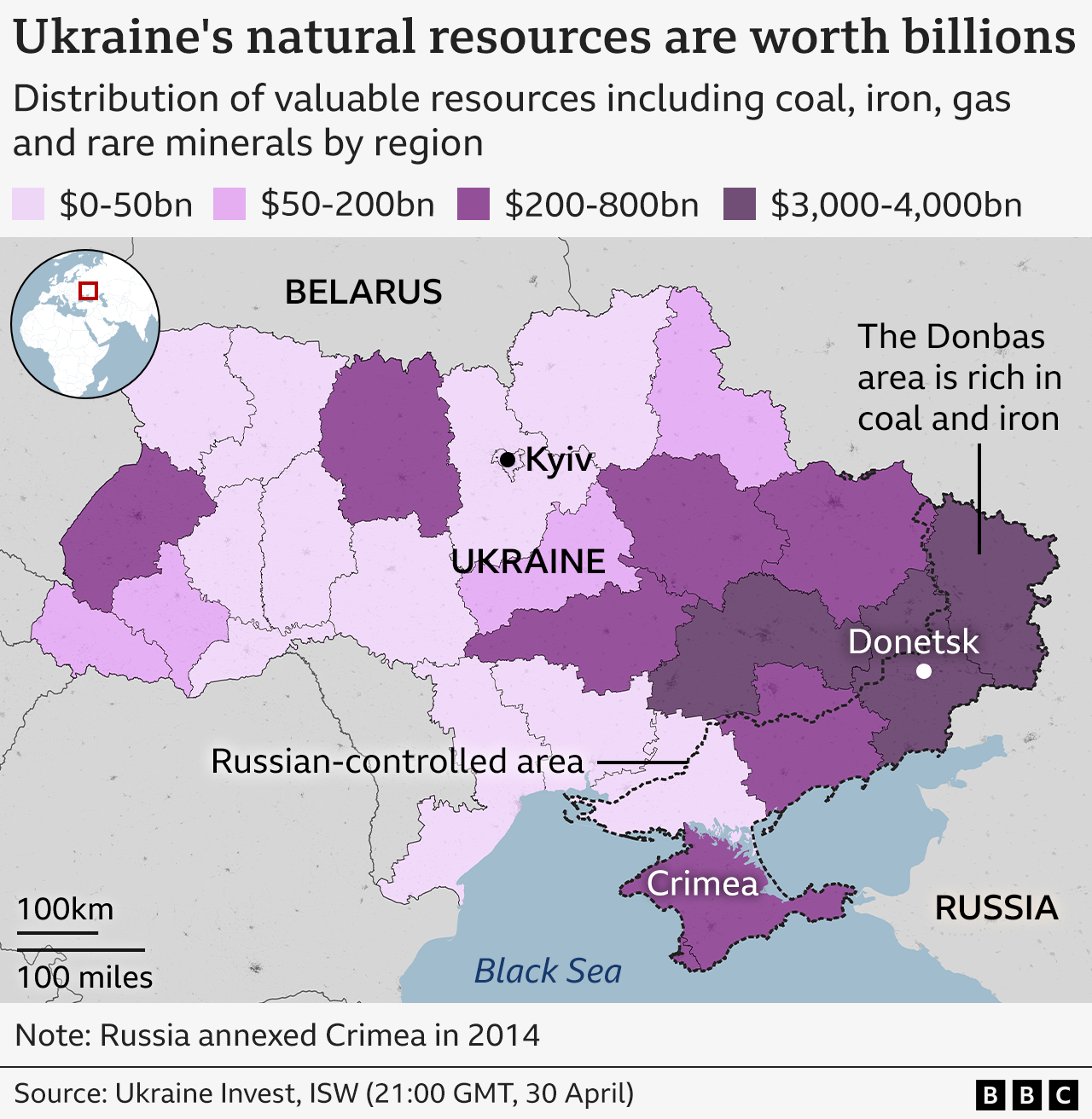What minerals does Ukraine have and what are they used for?

Ukraine has substantial supplies of key minerals, but some are now in Russian-occupied territory
- Published
A natural resources deal between the United States and Ukraine has finally been agreed after months of twists and turns.
The deal will see the two countries collaborate to ensure that "mutual assets, talents, and capabilities" can accelerate Ukraine's recovery, according to the US Treasury Department.
The US said the agreement "signals to Russia" that the Trump administration is "committed to a peace process centred on a free, sovereign, and prosperous" Ukraine.
It comes after months of uncertainty over the fate of an agreement, following Ukraine's President Volodymyr Zelensky clash with US President Donald Trump on a visit to the White House in February.
But the prospect of resurrecting the deal increased after the two leaders had a far more amicable conversation at the funeral of Pope Francis last week, and negotiators finally managed to get the deal over the line.
What minerals does Ukraine have?
Kyiv estimates that about 5% of the world's "critical raw materials" are in Ukraine.
This includes some 19m tonnes of proven reserves of graphite, which the Ukrainian Geological Survey state agency says makes the nation "one of the top five leading countries" for the supply of the mineral. Graphite is used to make batteries for electric vehicles.
Ukraine has 7% of Europe's supplies of titanium, a lightweight metal used in the construction of everything from aeroplanes to power stations.
It is also home to a third of all European lithium deposits, the key component in current batteries.
Other elements found in Ukraine include beryllium and uranium, which are both crucial for nuclear weapons and reactors.
Deposits of copper, lead, zinc, silver, nickel, cobalt and manganese are also significant.
Further, Ukraine has significant deposits of rare earth metals. These are a group of 17 elements that are used to produce weapons, wind turbines, electronics and other products vital in the modern world.

Some of the mineral deposits, however, have been seized by Russia. According to Svyrydenko, resources worth $350bn (£277bn) remain in occupied territories today.
In 2022, SecDev, a geopolitical risk consultancy based in Canada, conducted an evaluation, which established that Russia had occupied 63% of Ukrainian coal mines, as well as half of its manganese, caesium, tantalum and rare earth deposits.
Dr Robert Muggah, principal of SecDev, says that such minerals add a "strategic and economic dimension" in Russia's continued aggression. By seizing them, he says, Moscow denies access to revenue for Ukraine, expands its own resource base and influences global supply chains.
What we know about US-Ukraine minerals deal
- Published1 May
Three years on, Ukraine's extinction nightmare has returned
- Published24 February
Trump has changed Ukraine conversation, Starmer says
- Published24 February
Zelensky willing to give up presidency in exchange for Nato membership
- Published23 February

Why does the US want Ukraine's minerals?
Critical minerals "are the foundation of the 21st Century economy", Dr Muggah explained. They are key to renewable energy, military applications and industrial infrastructure and play "a growing strategic role in geopolitics and geoeconomics", he said.
Additionally, the US has been keen on a deal for Ukraine's mineral resources because it wants to reduce dependency on China, which controls 75% of rare earth deposits in the world, according to the Geological Investment Group.
In December, China banned the export of some rare earth minerals to the US, having previously limited mineral exports to the US the previous year.
Beijing then imposed more export controls on rare earth minerals as part of an escalating trade war with the US, sparked by Trump's announcement of sweeping tariffs in April.
Ros Atkins on... the fight for Ukraine's critical minerals
How will a deal help Kyiv exploit its minerals?
The draft of the deal appeared to give the US sweeping access to Ukrainian industries beyond minerals.
Ukraine's Deputy Prime Minister Yulia Svyrydenko said that the fund created by the agreement would "attract global investment into our country".
Some commentators described the initial US offer as "colonial", but Kyiv is interested in joint exploration of its resources.
According to the World Economic Forum, Ukraine has about 20,000 mineral deposits covering 116 types, but only about 15% of sites were being actively exploited at the time of Russia's full-scale invasion in 2022.
For instance, the country's sizeable lithium deposits are still largely untapped. Likewise, rare earth deposits are known to exist, but none of them have yet been mined, because of a lack of investment.
Developing these mineral resources is extremely difficult and expensive, according to Iryna Suprun, chief executive of the Geological Investment Group, a mining advisory firm based in Ukraine.
She argues that if Ukraine can attract US investors to help develop its natural resources, it will be highly beneficial for the country's economy.
"We will get technologies that our mining industry lacks so much," Ms Suprun explained. "We will get capital. That means more jobs, tax payments. We'll receive revenue from the development of mineral deposits."
Trump has previously suggested the presence of US contractors in Ukraine would act as a security guarantee to deter Russian aggression in the future, but Ukraine and European leaders have insisted that would not be enough.